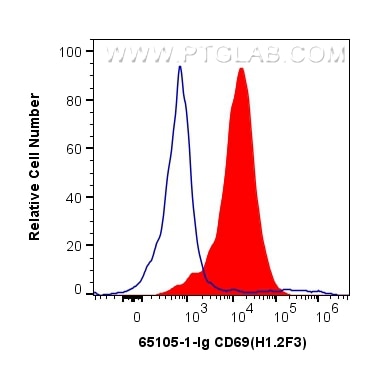CD69 Monoklonaler Antikörper
CD69 Monoklonal Antikörper für FC
Wirt / Isotyp
Armenian Hamster / IgG
Getestete Reaktivität
Maus
Anwendung
FC
Konjugation
Unkonjugiert
CloneNo.
H1.2F3
Kat-Nr. : 65105-1-Ig
Synonyme
Geprüfte Anwendungen
| Erfolgreiche Detektion in FC | Anti-CD3/CD28-stimulated mouse splenocytes |
Empfohlene Verdünnung
| Anwendung | Verdünnung |
|---|---|
| This reagent has been tested for flow cytometric analysis. It is recommended that this reagent should be titrated in each testing system to obtain optimal results. | |
| Sample-dependent, check data in validation data gallery | |
Produktinformation
65105-1-Ig bindet in FC CD69 und zeigt Reaktivität mit Maus
| Getestete Reaktivität | Maus |
| Wirt / Isotyp | Armenian Hamster / IgG |
| Klonalität | Monoklonal |
| Typ | Antikörper |
| Immunogen | Maus dendritische epidermale T-Zelllinie Y245 |
| Vollständiger Name | CD69 antigen |
| GenBank-Zugangsnummer | BC106997 |
| Gene symbol | Cd69 |
| Gene ID (NCBI) | 12515 |
| Konjugation | Unkonjugiert |
| Form | Liquid |
| Reinigungsmethode | Affinitätsreinigung |
| Lagerungspuffer | PBS with 0.09% sodium azide |
| Lagerungsbedingungen | Store at 2-8°C. Stable for one year after shipment. |
Hintergrundinformationen
CD69, also known as AIM, EA-1, Leu-23, and MLR3, is a type II transmembrane glycoprotein that belongs to the C-type lectin superfamily (PMID: 8340758; 7804122). CD69 is constitutively expressed by mature thymocytes, platelets, several subsets of tissue resident immune cells (including resident memory T cells and gamma delta T cells), and is inducibly expressed by activated T cells, B cells, natural killer (NK) cells, monocytes, neutrophils (PMID: 8100776; 28475283). CD69 has been identified as an early activation marker of lymphocytes and is commonly used as a marker of activated lymphocytes and NK cells (PMID: 28475283; 25759842). It is involved in the regulation of immune responses (PMID: 15745855).
Protokolle
| PRODUKTSPEZIFISCHE PROTOKOLLE | |
|---|---|
| FC protocol for CD69 antibody 65105-1-Ig | Download protocol |
| STANDARD-PROTOKOLLE | |
|---|---|
| Klicken Sie hier, um unsere Standardprotokolle anzuzeigen |


